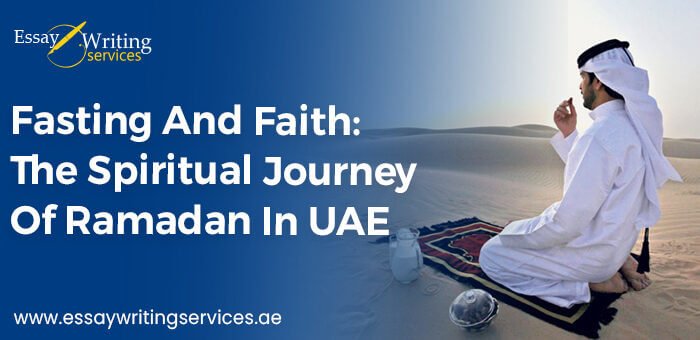
Fasting and Faith: The Spiritual Journey of Ramadan in UAE
Ramadan, Islam’s holiest month of the year in which Muslims from all across the world contemplate, grow spiritually, and also create healthy and spiritual bonds with their communities. This sacred month holds special importance in Abu Dhabi which is the capital of the United Arab Emirates (UAE), with a lively tapestry of customs, events, and gastronomic pleasures that brings people closer in harmony and devotion.
Breaking The Fast Together
In the iftar time, the meal is served at dusk to break the fast. However, this time is considered to be the most treasured ritual of Ramadan. Iftar, particularly in Abu Dhabi, are lavish celebrations of brotherhood and philanthropy. During Iftar, an abundance of people are visible across the city in hotels, restaurants, and mosques. During this period they feature a variety of traditional Emirati and international cuisines.
Suhoor
Suhoor is the period when Muslim have their pre-dawn meals consumed by Muslims prior to the fasting period. However, in Abu Dhabi, suhoor is a more intimate occasion. In this time food eaten at home or with family and friends at late-night cafes. All of this information I gleaned from essays written by essay writing services.
Cultural Events And Festivals
Muslims in Abu Dhabi celebrate Ramadan with a range of cultural and festive events that display the UAE’s rich spiritual culture. Moreover, there are numerous activities held in the city that keep both locals and visitors entertained. The celebrations includes dance and musical performances, art exhibits, and heritage tours.
The Ramadan Souk at the Abu Dhabi National Exhibition Centre (ADNEC) is the month’s highlight, with vendors selling everything from homemade crafts to scrumptious street cuisine. Families come here to shop, socialize, and take advantage of the festive mood.
Ramadan Facts
During Ramadan, the Al Fajr prayer (morning prayer) signals dawn, while the Al Maghrib prayer (evening prayer) signals dusk.
The term ‘Ramadan’ comes from the Arabic word ‘Ramadan’, which denotes great searing heat and dryness. Ramadan is meant to burn away sins.
The Islamic lunar calendar has twelve months, like the solar calendar, but it is eleven days shorter. Because a result of the 11-day change, the first day of Ramadan moves forward in the calendar month each year, and may come at a different time each year.
On a Ramadan night, the Prophet Mohammad (PBUH) received the first revelation of the Quran. Scholars believe that Islam and its duties based on the lunar calendar are a type of justice and mercy from God, as the months go through the seasons.
This rotation causes responsibilities such as Ramadan and Haj to fall in various seasons as well as during better weather, making them simpler.
Fasting Is The Fifth Pillars (duties)
The prohibition of food during the month of Ramadan became required in the second year of Al Hijra. Al Hijra, which meaning ‘the migration’, refers to Prophet Mohammad (PBUH) and his followers fleeing from Makkah, their home city, to Madinah to avoid punishment and torture.
Ramadan’s fast is more than just a food fast; individuals who fast should refrain from eating, drinking, and engaging in sexual activity. Lying, using harsh or offensive words, and backbiting are all considered sins in general, but they are especially terrible during Ramadan.
During Ramadan, Muslims strive to be more religious, giving, kind to others, and self-controlled.
Ramadan is about caring, sharing, and becoming closer to Allah.
During Ramadan special prayers are arranged which is named as Taraweeh are held. These are exclusively performed during Ramadan, following the Isha prayer (Evening Prayer).
The Ramadan spirit encourages people to gather for meals. Iftar, the meal served after breaking the fast, is typically a communal affair, shared with family and friends whenever possible.
To stay healthy when fasting, drink enough of water during non-fasting hours, particularly suhoor (pre-dawn meal).
Traditionally, someone should break their fast with a total of five dates and water, as dates provide a quick supply of energy and potassium.
Last Words
The month of Ramadan in Abu Dhabi is the time of spiritual renewal, and cultural festivals. Whether it’s the mutual enjoyment of iftar meals . The time during this entire month is very quiet and tranquil contemplation of pre-dawn suhoor. Additionally, there is a strong giving attitude throughout the community. However, the month of Ramadan captures the essence of the holy month in which every member of Abu Dhabi’s varied and friendly community. As the appearance of the crescent moon marks the beginning of another Ramadan, the people of Abu Dhabi gather once more, joined in their faith, kindness, and hope for a better future.

Leave a Reply